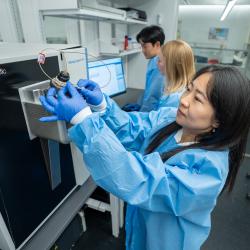Developing A Single-Neuron Protein Mass Analyzer
What it takes to build an instrument thousands of times more sensitive than anything that came before.
This video outlines how Dr. Peter Nemes and his research group built this single-neuron protein mass analyzer and touches on the contributions it is making to the field of neuroscience and cell biology at large. Click on the video to begin viewing
Proteins are the workhorses of life on a molecular scale. They drive communications between cells and fulfill biological functions. To understand how living systems work, scientists must be able to discern which cells produce which proteins and at what amounts. Until very recently, a tool sensitive enough to measure the diverse output within a single cell did not exist. A lack of such technology has been a major impediment in the study of normal and impaired brain development and function.
With the development of a single-neuron protein mass analyzer by UMD Chemistry and Biochemistry Associate Professor Peter Nemes, a new door opened in the study of proteins in the brain. Nemes and his research group had to clear multiple hurdles to move from a technology that could detect the proteins produced by a pool of many thousands of cells to one that could analyze a single cell, specifically a neuron in the brain.
Nemes and his research team began by extracting the small amount of protein from a single cell. Next, they built an ultrasensitive instrument to detect these tiny amounts of material by developing a platform to ionize the proteins and guide them into a mass spectrometer. Finally, they developed specialized experimental strategies and a software package to make the mass spectrometer better at detecting the trace levels of signal from such miniscule quantities of protein in a single neuron.
It took Nemes four years to build this new instrument. The neuroscientists he collaborates with say the technology is opening new avenues of research that they could only dream about before.
This video outlines how Nemes and his research group built this single-neuron protein mass analyzer and touches on the contributions it is making to the field of neuroscience and cell biology at large.






